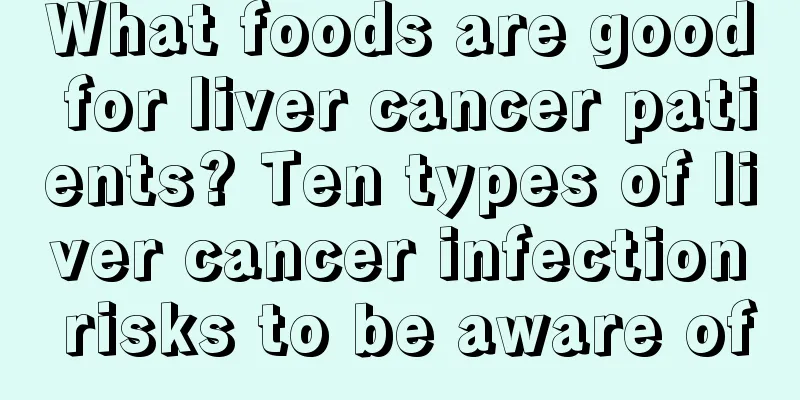What foods are good for liver cancer patients? Ten types of liver cancer infection risks to be aware of

|
Patients with liver cancer should eat more foods that are good for the body. They should eat high-protein and high-vitamin foods every day. These foods will help their body get better faster. They can also eat more foods that enhance appetite. Because many patients will feel that their appetite is not very good during treatment, they can consume some appetizers in moderation. Nutritional disorders: 1. Explain to the patient the importance of nutrient intake and guide the patient to adopt a reasonable diet structure, giving the patient a high-calorie, moderate-protein, high-vitamin, low-fat, easily digestible diet, small meals and frequent meals, and avoid irritating foods. 2. Take measures to increase appetite: 1) Choose food varieties that the patient likes and are suitable for the condition, and change them frequently. Pay attention to color, aroma, taste and nutritional content when cooking. 2) Create a good eating environment, such as fresh air and quietness, and clean up vomit in time. 3. Do not perform any treatment, care or examination that may cause pain or discomfort before or during meals. 4. Take digestive aids and liver protection drugs as prescribed by the doctor. 5. Provide nutritional support as prescribed by the doctor: intravenous high-price nutrition (parenteral nutrition), elemental diet (gastrointestinal nutrition). For care, please refer to the relevant chapters. 6. Take physical examinations of patients regularly to understand their nutritional status. 7. Monitor hemoglobin and give small amounts of blood or albumin transfusions if necessary. Risk of infection 1. Assess potential risk factors for infection and inform patients so that they can cooperate with treatment and care. 2. Strengthen skin care, keep the bed clean and dry, and help the patient turn over once every 2 hours to prevent skin damage and infection. 3. Strengthen oral care during fasting, 2-3 times a day to prevent oral infection. 4. Strengthen nutrition and provide systemic supportive therapy, such as transfusion of fresh blood and amino acids, to enhance the body's defense function and tissue repair ability. 5. When changing dressings, performing treatments, and providing nursing care, strictly follow aseptic operation procedures to cut off the source of infection. 6. Keep the drainage tubes open, observe and record the nature and amount of the drainage, and perform bacterial culture if necessary. Generally, the incision drainage tubes should be removed within 24-48 hours to prevent abdominal infection. 7. Instruct the patient not to open or touch the wound at will to avoid contamination of the wound. 8. Demonstrate effective coughing methods and instruct patients to take measures to prevent incision pain when coughing. 9. Use antibiotics rationally as prescribed by your doctor to prevent and control infection. 10. Guide patients to identify the precursor symptoms of infection so that they can detect signs of infection in a timely and early manner. |
<<: What can you eat to prevent liver cancer? Eating this regularly can prevent liver cancer
>>: Is there a cure for advanced lung cancer? What are the treatments for lung cancer?
Recommend
What should patients with colorectal cancer pay attention to when exercising
What should patients with colorectal cancer pay a...
Does the three shots of rabies vaccine contain antibodies?
As we all know, the full course of rabies vaccina...
Can patients with prostate cancer drink tea?
Prostate cancer is a very common disease with a h...
The dangers of blue light exposure at home
Blue light has certain harmful effects on human h...
The advantages and disadvantages of enema coffee
Enema coffee can play a certain role in clearing ...
What is the cause of upper limb pain
If you sit in one position for too long, you will...
How to care for Fraxinus chinensis bonsai?
Many people like to grow some flowers and plants....
Symptoms of glioma in children's brain
Children's brain gliomas may cause symptoms s...
What are some small ways to lift your buttocks
Many people around us are already very outstandin...
What are the effects of cola ginger water
Cola ginger water is a common beverage made with ...
Is acne surgery useful?
Today's medical technology is relatively adva...
How to use preventive medication for osteosarcoma
Osteosarcoma ranks first or second in the inciden...
What to do if you have breast cancer
Breast cancer is the most common malignant tumor ...
What to do if total cholesterol is high
Total cholesterol is the sum of all cholesterol. ...
What to do if there are blackheads next to the nose
Blackheads are a problem that bothers many people...









